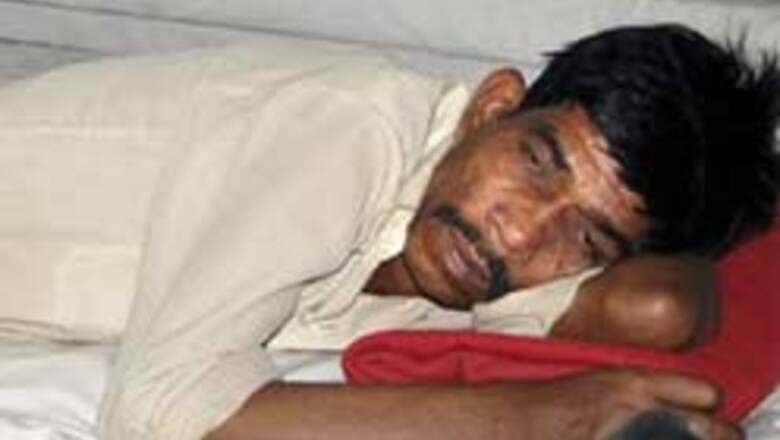
views
Gorakhpur: When Durga Prasad heard of the mysterious job with the hefty paycheck, he jumped at it, no questions asked.
The work could be risky - Prasad figured he'd be asked to smuggle drugs into Nepal - but for the itinerant laborer from Uttar Pradesh, the money was worth it: Rs 250 a day.
''I knew it must be some illegal work because no one pays so much money to an illiterate person like me,'' Prasad said.
The salary turned out to be part of a trap that ensnared Prasad and 14 other poor laborers, who were held captive while their blood was drained for sale to private medical clinics.
The case has raised concerns about medical oversight in India.
Five men have been arrested in the illegal racket, but authorities are still searching for the suspected ringleader, said police official Brij Lal.
Prasad and the 14 others were rescued two weeks ago from a small filthy room inside a house in the slums of Gorakhpur, a town about 155 miles southeast of Lucknow, the capital of Uttar Pradesh, police said.
Towns like this have largely missed out on the prosperity of India's booming economy, and the blood racket victims are among the 300 million who live on less than Rs 50 a day.
Desperate laborers often get caught in dangerous scams - earlier this year, police raided a home in a wealthy New Delhi suburb where doctors were allegedly drugging the poor and stealing their kidneys.
Some of the men in Gorakhpur apparently sold their blood willingly, but the payments stopped early on, and when they asked for money they said they were beaten.
Rustam Khan, another victim, said he came to Gorakhpur from West Bengal state to earn money to pay for his daughter's wedding.
''I sold my blood for money ... Still I could not arrange money for my daughter's marriage,'' he said.
While cases like these highlight the vulnerability of the poor, they also raise serious concerns about the complicity of the medical establishment and the lack of proper oversight over hospitals and clinics.
With an estimated 45 million uninsured Americans, some 5,00,000 trek overseas each year for medical treatment, according to the National Coalition on Health Care - much of it at Asian hospitals in Thailand, Singapore and India.
PAGE_BREAK
The low cost of medical care in India has made it a popular destination for Americans and other foreigners in need of everything from tummy tucks to hip replacements or heart surgery.
While India has a range of laws overseeing medical care, enforcement is often exceedingly lax and corruption is widespread. Screening donors for illegal drug use or exposure to diseases like AIDS, hepatitis B or C, or malaria is usually left to individual clinics and hospitals.
State Health Minister Anant Kumar Mishra said the blood racket case has prompted new rules for using blood donations. ''Daily records have to be maintained about the source of blood. It has to be specific information, whether the blood is from a donor or is bought from a blood bank,'' Mishra told The Associated Press, adding that these reports would have to be submitted every week.
Three clinics found to have bought the blood have been shut, he said, and police were investigating clinic personnel.
However, he said blood banks are perilously understocked in northern India, where many people don't understand the need for blood donations.
''We do not have donors,'' he said. ''Even relatives of those patients who need blood shy away from donating. This leads to such rackets.''
There were also fears for the health of the captives as well as those who received their blood.
Prasad said he was held for nearly six months and captors took his blood at least three times a week. Adults can safely donate blood about once every two months, according to American Red Cross guidelines.
By the time he was rescued, the father of two weighed just 84 pounds. It took him and the others three days to regain enough strength to stand.
''He has been reduced to just a skeleton,'' said his wife, Sunita Rani. ''They sucked my husband's blood and left him to die.''
Suresh Mishra, a doctor at a local hospital, said all the victims were anemic. Police official D K Chaudhry said some might be drug addicts who agreed to trade their blood for drugs.
Prasad didn't respond when asked if he used drugs.
''We do not know as how many people might have contacted diseases after transfusion of blood of these drug addicts,'' said Radha Mohan Das Agarwal, a doctor and opposition lawmaker from Gorakhpur.
''It is a heinous crime,'' said Agarwal. ''The doctors were literally playing with the lives of the people.''




















Comments
0 comment